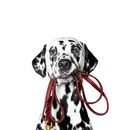Dogs are not only loyal companions, but often also part of the family. It is therefore important to be well informed about their diet. One frequently asked question is whether dogs are allowed to eat cheese. This detailed blog post explains which types of cheese are suitable for dogs and which should be avoided.
The basics of feeding cheese to dogs
Before we get into the specific types of cheese, it's important to understand the basics. Cheese contains proteins, fats, vitamins and minerals that can also be beneficial for dogs. However, care must be taken as cheese also contains lactose, which some dogs cannot digest well.
Tolerance of lactose in dogs
The ability to digest lactose varies from dog to dog. While some dogs tolerate dairy products well, others may develop gastrointestinal problems such as diarrhea or bloating. It is recommended to start with small amounts and observe the dog's reaction.

Suitable cheeses for dogs
When feeding our four-legged friends, it is important not only to ensure a balanced diet, but also to consider their tolerance to certain foods. Cheese, a popular treat in many households, is no exception. Although not all cheeses are suitable for dogs, there are some that can be fed in moderation and even offer health benefits. In this section, we take a look at the variety of cheeses and identify which types are suitable for feeding your dog.
1. cheddar
Cheddar is a common and popular cheese for many dog owners to feed their four-legged friends. This cheese is rich in protein, which is important for building and maintaining muscle. Cheddar also provides a good source of calcium, which is necessary for strong bones and teeth. However, cheddar is also relatively high in fat, which can lead to obesity and other health problems if consumed in excess. Cheddar should therefore only be given in small amounts and as an occasional treat. Especially for dogs that are prone to obesity or need a low-fat diet, it is advisable to limit cheddar consumption.
2. mozzarella
Mozzarella is another good option for dogs, mainly because of its lower fat content compared to other cheeses. This mild, soft cheese is often better tolerated by dogs that are sensitive to fatty foods. Mozzarella also provides a good source of protein and is rich in calcium. Since mozzarella usually contains less salt, it is a safer choice compared to high-salt cheeses. As with any dairy product, dog owners should be careful to feed mozzarella in moderate amounts to avoid digestive problems.
3. cottage cheese
Cottage cheese is a particularly recommended option for dogs. It is characterized by a low lactose content, which makes it a good choice for dogs with lactose intolerance or sensitive digestive systems. Cottage cheese is high in protein and calcium, but relatively low in fat and salt, making it a healthy addition to a dog's diet. In addition, cottage cheese is easy to digest and can also be used to good effect in dogs recovering from illness or requiring a gentler diet. It is recommended to feed cottage cheese in moderate amounts, as again, too much of a good thing can be problematic.
Cheeses that should be avoided
There are also cheeses that are not suitable for dogs:
1. blue cheese
Blue cheese, such as Roquefort, Gorgonzola or Stilton, is particularly problematic for dogs. The reason for this is that they contain mold cultures and certain substances that can be toxic to dogs. These cheeses often contain Penicillium Roqueforti mold, which produces Roquefortin C, a mycotoxin. Roquefortin C can lead to symptoms such as gastrointestinal disorders, cramps and in severe cases even neurological problems in dogs. Therefore, blue cheese should be completely avoided in a dog's diet.
2. seasoned cheese
Seasoned cheese often contains additives such as garlic, onions or herbs, which can be toxic to dogs. Garlic and onions, for example, contain thiosulfates, which can lead to the destruction of red blood cells in dogs, resulting in anemia. Other spices and herbs can also cause digestive problems, allergic reactions or other health problems in dogs. Therefore, it is important to refrain from feeding any type of flavored cheese to dogs.
3. cheese with a high salt content
Cheese with a high salt content, such as feta or halloumi, can be harmful to dogs. A high salt content in a dog's diet can lead to excessive strain on the kidneys and cause symptoms such as thirst, frequent urination, vomiting and, in severe cases, sodium ion poisoning. This poisoning can cause neurological symptoms such as tremors, seizures and in extreme cases even death. It is therefore advisable to give dogs cheese with a low salt content and to avoid the consumption of salty cheeses.

Correct dosage
The amount of cheese a dog is allowed to eat depends on its size, weight and general health. As a rule of thumb, cheese should only be eaten as an occasional treat and not as a main source of nutrition.
Health benefits and risks
Cheese can offer some benefits for dogs, such as providing calcium and protein. However, too much cheese comes with risks, including weight gain and digestive problems.
The decision as to whether a dog can eat cheese should be based on their individual tolerance and the specific properties of the cheese. It is always advisable to seek the advice of a vet if you are unsure.
In summary, cheese can be a safe and tasty treat in moderation and taking into account the dog's individual tolerance. It is important to pay attention to the quality of the cheese and to avoid cheeses that are unsuitable for dogs.



















